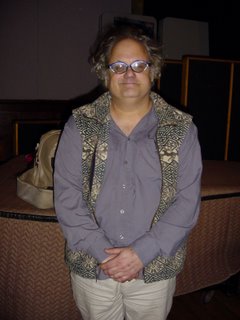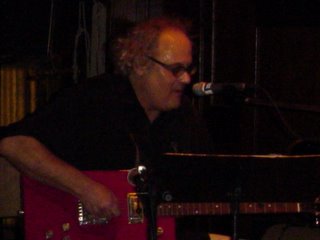(The following is reprinted from the "print edition" of my blog, which also includes an interview with Eugene Chadbourne, not yet seen online... It's out there at the usual places one finds these things -- Noize, Scratch, Zulu, and various other places downtown and in Kits (East Van distribution is, I hope, tonight...).
The koto is a traditional Japanese harp. Though it is usually employed in the performance of Japanese classical music, it is also of interest to avant gardists.
Michiyo Yagi (I’m using Western name-order for this, note) is one of the most passionate and interesting of Japan’s koto virtuosos and has recorded for Tzadik; she is part (along with Sachiko M. and Haco) of the avant-garde girl-pop trio Hoahio, and has played alongside John Zorn, Bill Laswell, Mark Dresser, and many, many Japanese musicians.
Miya Masaoka is based in San Francisco and has played with Ornette Coleman, Steve Coleman, Pharoah Sanders, Bang on a Can, Gerry Hemingway, and various symphony orchestras; she has played at a few Vancouver International Jazz Festivals, alongside Fred Frith and Joelle Leandre, among others. One of the more unlikely and unusual koto players, however, was not born in Japan, but Saskatchewan.
Brett Larner has played with Japanese and American avant-gardists, traditionalists and jazz musicians; his teachers are Anthony Braxton and Kazue Sawai. He is currently based in Tokyo, but will be performing in Vancouver on November 18th, accompanying Seattle-based avant gardist and Long String Instrument designer
Ellen Fullman.
I first saw Brett Larner at the
Deluxe Improvisation Festival, 2001, in Azabujuban, Tokyo. Almost all the other dozen or so performers on the bill that day (with the exception of NY expat drummer Samm Bennett and visiting clarinetist Gene Coleman) were Japanese, including Yoshihide Otomo, Tetsu Saitoh, and Taku Sugimoto. The music was experimental and improvisatory and often the ideas behind the compositions were as important as the music itself. Brett’s performance stood out as the most interesting to watch; it was also the most minimal, both in terms of the music he produced and in terms of the requirements of performance. Interested in generating drones and sustained tones from an instrument that is normally plucked or strummed, he set gyroscopes between the strings and let them spin. Occasionally, when they fell over, he would right them, sometimes relocating them. Otherwise he knelt on the floor, watching and listening. The audience – also primarily Japanese – quietly and intensely listened along.
It was a memorable concert. At the time, I had a hard time getting into the CD of Brett’s gyroscope drones,
Telemetry Transmission: Music for Koto and Gyroscopes, and ended up leaving it behind when I returned from Japan, somewhat to my regret; but I ran into him a couple of times after that, and quite liked him. His new project in Vancouver is performing Ellen Fullman’s “long string instrument” at the Western Front, on Friday, November 18th. I asked Brett about what to expect and about his relationship to the avant garde music scene in Japan...
Allan: How welcomed do you feel in the Japanese scene?
Brett: It's varied a bit over the years, but for the most part very welcome. I've always kind of been in both the koto and improv scenes there. When I moved there for the first time in '97 I was immediately active as a koto player but it took a few years before i really started working regularly with the onkyo (minimal laptop noise) people and other improvisers. I usually felt like I was part of things, not treated differently or anything. Of course that affected my relationship with the koto world, but that's kind of a longer story. Since I've been back (in Japan) this time (a year now) I've been laying low for the most part, just practicing every day, but still hang out and periodically playing with (Tetsuzi) Akiyama, Toshimaru (Nakamura) etc. ( see http://www.japanimprov.com/ for more).
A: How isolated do you feel from the North American scene?
B: Fairly, although it varies. I still have contacts and work with people in SF, but other than that no real involvement. There are a few young guys here, Jeffrey Allport, Jonah Fortune, Ryan Mitchell-Morrisson etc. with whom I play whenever I'm here.
A: Is your relocation more or less permanent?
B: Hopefully. I'm there on a Canada Council grant which goes through March. I'd like to stay, but the question of course is how.
A: What keeps you in Japan?
B: Hmmn, big question. Easiest answers: Tokyo is infinite and I like the freedom which comes from existing completely outside a thriving society. The amount and especially quality of artistic activity is stimulating too. And food.
A: Would you recommend relocating to Japan to avant garde musicians…?
B: There is a lot going on there and opportunities abound, but there are many difficulties including visas, high prices, alienation, alcoholism, etc.....I would recommend touring, at least.
A: How does Canada seem to you when you return?
B: Oh man, I thought this was supposed to be a puff piece.....Well, except for part of last year here in Vancouver I haven't actually lived in Canada since '86 when I was 13, so I don't know if I'm qualified to give an answer. The gov't support available for artists here through the Canada Council and other agencies is world-class and something everyone should be proud of.
A: What are your musical interests -- do you listen to a lot of drone music? Minimalism? Noise?
B: My tastes are very wide ranging. John Fahey was my original inspiration to become a musician, long before the O'Rourke revival. I still listen to his music almost every day. Yes, I listen to drone music, not so much Minimalism (in the Reich-Glass vein, anyway), go through phases with noise. Pop music too, especially indie j-pop.
A: Do you also play koto in a traditional mode?
B: Yes. I also play jiuta shamisen and the associated classical vocal repertoire. My emphasis is on contemporary material but I have studied the traditional body of music for many years.
A: Do Japanese ever react negatively to a non-Japanese's non-traditional use of a traditional Japanese instrument?
B: Sometimes, but such things are fairly common these days inside Japan so there is less of such a perception than people outside Japan tend to think.
A: What got you involved with the koto?
B: When I was 18 I saw Kazue Sawai, the world's greatest koto player, perform. That was it. I started studying with Miki Maruta, a former student of Sawai's, then when I finished university I moved to Tokyo to become Sawai's student myself.
A: How did you get involved with Ellen Fullman?
B: I've listened to her music for years. A friend of mine, the late Matthew Sperry, joined her ensemble when she moved to Seattle and sort of got us in touch. I didn't actually meet her though until we were both in SF a couple of years ago. I brought her over to Tokyo in Sept. for 2 days of concerts, our first actual collaboration. The highlight, personally, was a trio of Ellen, myself, and Keiji Haino. A ridiculous combination but successful somehow.
A: What can we expect on Friday?
B: The first half will be some of my compositions for acoustic guitar ensemble. This music, like Ellen's work, utilizes longitudinal mode vibration of strings to produce extremely unusual and beautiful sounds. The singer from my pop band Cinnamon, Kanoko Nishi, will be part of the ensemble and so we may also do one song from our CD "Pony Up!" The second half will be Nishi and I on koto and bass koto playing a composition of Ellen's which is an extension of our work together in Japan. Ellen's long string instrument really has to be seen and heard live to be appreciated. It's amazing.
(See Ellen Fullman’s Long String Instrument and Brett Larner at the
Western Front on Nov. 18th).

